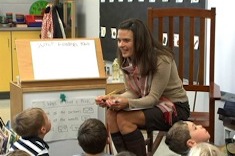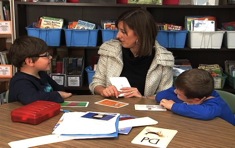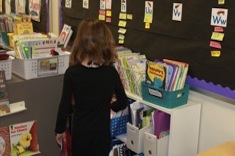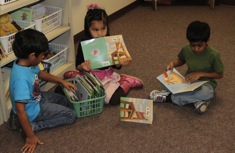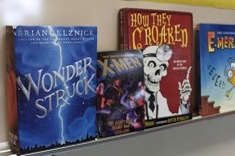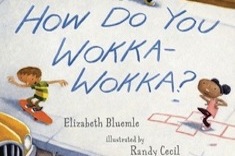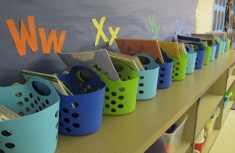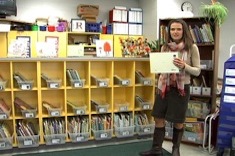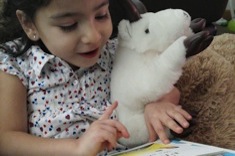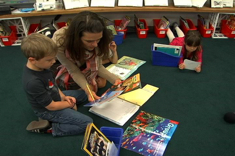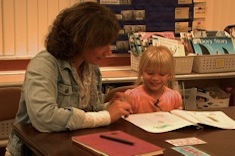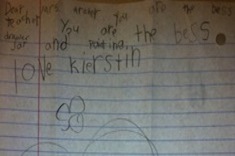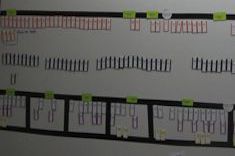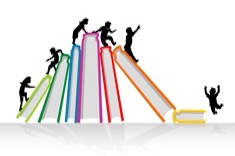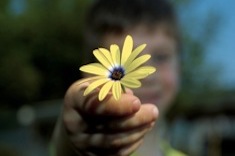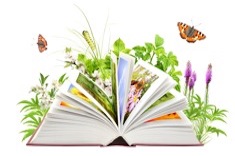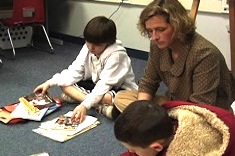Kindergarten
Latest Content
Shared Writing in Kindergarten
Mandy Robek leads a shared-writing session in kindergarten.
Teaching Search Skill Basics to Students
Bill Bass has advice for teaching web-based search skills to students.
Small-Group Writing: Steps for Success
Cathy Mere provides grouping guidelines for primary teachers.
Frog and Toad and Tina and Maya: A Precocious Kindergarten Reading Group
Suzy Kaback ponders the precociousness of two kindergarten readers.
Science Observations in Kindergarten
Mandy Robek helps her kindergarten students complete science observations.
Kindergarten Small Group: Concepts of Print
Clare Landrigan leads a "quick and frequent" small group that integrates phonemic awareness activities with assessment.
Picture Books or Beginning Readers?
Many beloved characters from picture books are showing up in beginning readers, and in the process can lose a lot of their appeal. Shari Frost provides teachers with criteria for choosing between picture books or beginning readers.
Reading Workshop in Kindergarten: When and How to Launch
Clare Landrigan and Tammy Mulligan share wise advice about launching workshops in kindergarten.
Word Work Basics
Max Brand explains the basics of word work, including a list of reflective questions teachers can ask themselves and students.
Can Books Harm Children? Support and Censorship
Shari Frost asks a provocative question: Can books harm children? She explores practical ways for teachers to walk the fine line between support and censorship in matching books to students.
Books for Brain Breaks
Mandy Robek compiles a list of her favorite books for brain breaks with young learners.
Effective Organization
Ruth Ayres has tips for organizing desks, tables, chairs, and materials to support literacy learning.
Room Tour: Mandy Robek’s Kindergarten Classroom
Mandy Robek gives a tour of her kindergarten classroom, highlighting literacy spaces that build relationships and independence for her young learners.
Launching a Sort
Launching a sort with primary students early in the year begins not with words, but with leaves for Max Brand.
Launching Reading Workshop: Mentor Texts
Mandy Robek shares her favorite texts to use early in the year with young students to introduce them to everything from places to read to how to handle books.
Animal Backpacks and Literacy Joy
Kelly Petrin finds animal backpacks are a wonderful tool for building literacy skills in young learners, as well as the home/school connection.
Book Choice Conference in Kindergarten
Mandy Robek has a book choice conference with Drew. This is the first installment in her kindergarten conferring series.
Conferring About Illustration in Kindergarten
Ruth Ayres confers with five-year-old Abby about her apple illustration early in the school year.
Kindergarten Moments Count: Morning Message
Keri Archer writes about the importance of morning message for kindergartners.
A Booklist for Memorial Day
Sarah Klim’s latest booklist includes titles for honoring those who serve on Memorial Day.
The Data Wall Debacle
Shari Frost has a suggestion for what shouldn’t be on classroom walls: student assessment scores. She explains why this practice can be harmful to students.
Understanding the Summer Slide: Sharing Data with Parents and Students
Clare Landrigan and Tammy Mulligan explain why it is important to share data with parents while school is still in session in order to avoid the summer slide. This is another installment in their summer reading series.
The Gifts of Literacy
Kelly Petrin reflects on what she values most in the final days with children in her preschool program, and what she shares with parents.
Reading Through Spring
Gigi McAllister has many suggestions for a strong reading finish to the school year.
Celebrating Screen-Free Week (BOOKLIST)
Screen-Free Week is scheduled for May 5-11 this year. Here are some book suggestions to help you explore the issue with students.
A Booklist for Earth Day
Earth Day is celebrated on April 22. Sarah Klim presents some favorite titles to share with students and build awareness in this booklist.
Word Observations
Max Brand describes how word observations can work as powerful minilessons in elementary classrooms.
Multiple Strategies for Kindergarten Readers
Tammy Mulligan explains why it’s important to encourage kindergarten students to use other strategies beyond “sound it out” in this demonstration small group.
Children’s Literature for the Olympics
The Olympics are just around the corner, and Sarah Klim has suggestions for read alouds in a new booklist.
Jennifer Serravallo on Formative Assessment (PODCAST)
Franki Sibberson chats with Jennifer Serravallo about formative assessment in this podcast. Jennifer is the author of The Literacy Teacher’s Playbook, Grades 3-6: Four Steps for Turning Assessment Data into Goal-Directed Instruction.
Browse Content By
Type
Category
- Assessment Tools
- Big Fresh Archives
- Booklists
- Choice Numeracy
- Classroom Design
- Common Core
- Community Building
- Conferring
- Content Literacy
- Digital Literacy
- English Language Learners
- Equity
- Family Relations
- Free Samples
- Guiding Groups
- Leadership
- Literacy Coaches
- Mentor Texts
- Minilessons
- New Teacher Mentors
- Podcasts
- Poetry
- Quote Collections
- Reading Strategies
- Self Care
- Struggling and Striving Learners
- Talking and Listening
- Teacher Study Groups
- Teaching Reading
- Teaching Writing
- Word Study and Vocabulary
Author
- Melissa Quimby
- Nawal Qarooni
- Gwen Blumberg
- Julie Cox
- The Lead Learners
- Hannah Tills
- Josie Stewart
- Ruth Metcalfe
- Mallory Messenger
- Becca Burk
- Jodie Bailey
- Vivian Chen
- Mary Brower
- Tiffany Abbott Fuller
- Stephanie Affinito
- Ruth Ayres
- Leigh Anne Eck
- Heather Fisher
- Shari Frost
- Julie Johnson
- Suzy Kaback
- Gigi McAllister
- Shirl McPhillips
- Melanie Meehan
- Cathy Mere
- Debbie Miller
- Tara Barnett and Kate Mills
- Tammy Mulligan
- Dana Murphy
- Bitsy Parks
- David Pittman
- Brenda Power
- Heather Rader
- Matt Renwick
- Mandy Robek
- Christy Rush-Levine
- Gretchen Schroeder
- Jen Schwanke
- Brian Sepe
- Katherine Sokolowski
- Stella Villalba
- Jennifer Vincent
Grade Level
Choice Literacy Membership
Articles
Get full access to all Choice Literacy article content
Videos
Get full access to all Choice Literacy video content
Courses
Access Choice Literacy course curriculum and training

